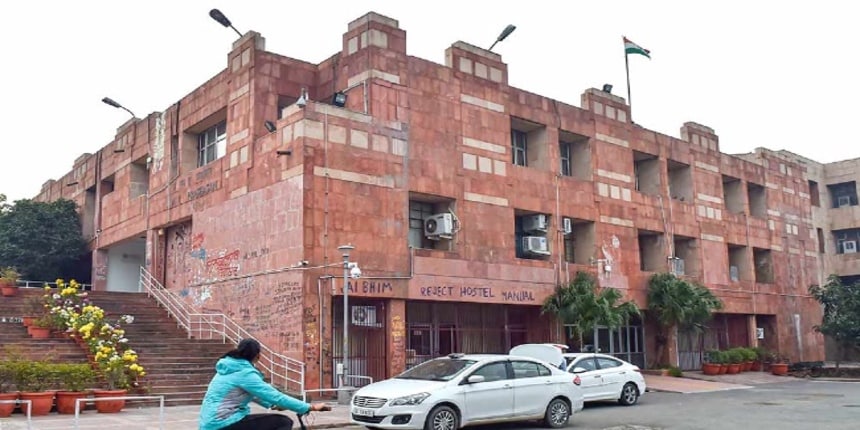JNU bans protests within 100 m of academic buildings; students may face expulsion if rules flouted
Press Trust of India | December 11, 2023 | 09:29 PM IST | 3 mins read
The JNU Students' Union (JNUSU) has opposed the new rules saying that it is an attempt to stifle dissent on campus and demanded its withdrawal.

NEW DELHI: Putting up wall posters and staging dharnas within 100 metres of the academic buildings at the Jawaharlal Nehru University can lead to a fine of up to Rs 20,000 or expulsion while any "anti-national" act will attract a Rs 10,000 fine, according to a new manual.
The academic buildings of different schools house offices of chairpersons, deans, and other important office-bearers, apart from classrooms and labs.
Earlier, protests within 100 metres of the administrative blocks, which house the offices of the Vice-Chancellor, registrar, and proctors, among others, was prohibited as per a High Court order.
However, according to the revised Chief Proctor Office (CPO) manual, the university has now barred protests within 100 metres of academic buildings as well where classes are conducted.
Any act to incite intolerance towards a religion, caste, or community or an activity which is deemed "anti-national" will be imposed with a fine of Rs 10,000. This development comes after the JNU in October witnessed an incident where an "anti-national" slogan was scribbled on the School of Languages building wall and the administration announced to set up a committee to look into the repeated nature of such incidents on the campus.
The JNU Students' Union (JNUSU) has opposed the new rules saying that it is an attempt to stifle dissent on campus and demanded its withdrawal.
"The stringent measures outlined in the manual are aimed at stifling the vibrant campus culture that has defined JNU for decades. The JNUSU demands that the university administration immediately revoke the new manual of the office of the Chief Proctor Manual," the students' union said.
Calls and texts to JNU registrar Ravikesh did not elicit a response. Under the new rules, approved by the Executive Council in a meeting on November 24, the Vice-Chancellor Santishree Dhulipudi Pandit or the competent authority will have the power to deem an act punishable if they find it in violation of the disciple and conduct in the university. They also have the power to waive, change or uphold the punishment if deemed fit.
The university has prohibited printing, circulating or pasting posters or pamphlets carrying any kind of derogatory religious, communal, casteist or anti-national remarks.
If a student is found involved in a hunger strike, dharna, 'group bargaining' and any other form of protest within 100-metre radius of any academic and administrative complex or is found blocking entrance or exit of any of these complexes, he or she will be either imposed a fine of Rs 20,000, evicted from hostel for two months or be rusticated and declared out of bounds for up to two months, the CPO manual said.
All forms of coercion such as gheraos, sit-ins or any variation of the same which disrupt the normal academic and administrative functioning of the university or any act inciting violence will be punished as well, it added. A student who has received five or more punishments during the duration of their study shall be expelled from the university, the manual noted.
In case a student is found guilty of being involved in any of the prohibited activities and is given a punishment, he or she will not be allowed to register for the semester and they would not be given a 'no-dues' certificate until the imposed fine is cleared.
The administration will also send a copy of the punishment to the parents or guardian of the student besides uploading it on the official website. If a student fails to appear before the proctorial enquiry, the committee will assume that the complaint was filed with a malafide intention and the student may be asked to perform community service in JNU. Any false allegation against any student by the complainant can also lead to rustication from the university.
ALSO READ I JNU to patent logo, add 'Tamso ma Jyotirgamaya' motto
Furthermore, the university now will not allow cross-examination between defendant and complainant or the witness, which use to be an important rule of the proctorial enquiry earlier.
The Vice-Chancellor's decision will be the final call, in case any dispute arises with regard to the interpretation of any of these rules, the manual said.
Follow us for the latest education news on colleges and universities, admission, courses, exams, research, education policies, study abroad and more..
To get in touch, write to us at news@careers360.com.